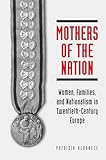Mothers of the Nation : Women, Families, and Nationalism in Twentieth-Century Europe / Patrizia Albanese.
Material type: TextSeries: Studies in Comparative Political Economy and Public PolicyPublisher: Toronto : University of Toronto Press, [2006]Copyright date: ©2006Description: 1 online resource (224 p.)Content type:
TextSeries: Studies in Comparative Political Economy and Public PolicyPublisher: Toronto : University of Toronto Press, [2006]Copyright date: ©2006Description: 1 online resource (224 p.)Content type: - 9780802090157
- 9781442677432
- 305.42/094/0904
- HQ1236.5.E85 A42 2006eb
- online - DeGruyter
| Item type | Current library | Call number | URL | Status | Notes | Barcode | |
|---|---|---|---|---|---|---|---|
 eBook
eBook
|
Biblioteca "Angelicum" Pont. Univ. S.Tommaso d'Aquino Nuvola online | online - DeGruyter (Browse shelf(Opens below)) | Online access | Not for loan (Accesso limitato) | Accesso per gli utenti autorizzati / Access for authorized users | (dgr)9781442677432 |
restricted access online access with authorization star
http://purl.org/coar/access_right/c_16ec
How do nationalist governments cope with gender relations? Do their policies modernize, or entrench pre-modern gender roles? In Mothers of the Nation, Patrizia Albanese addresses these questions by assessing the impact of nationalist regimes on the status of women and families in Germany, Italy, Yugoslavia, and Russia, at two different points in history: the aftermath of the First World War, which saw a rise in the number of nationalist governments in power, and the last decade of the twentieth century, which saw a revival of ethno-nationalist sentiment in these areas.Comparing nationalist and non-nationalist polities in order to establish the degree to which these governments differ in their treatment of women and families, Albanese concludes that although most ethno-nationalist regimes intend to return women to their 'natural' place in the home as housewives and mothers, their initiatives are mostly ineffective. These reforms are vehemently opposed by women's groups or individual women, are often reversed by subsequent governments, and have little long term demographic impact. Mothers of the Nation is an important addition to the study of women in a transnational context.
Mode of access: Internet via World Wide Web.
In English.
Description based on online resource; title from PDF title page (publisher's Web site, viewed 01. Nov 2023)


